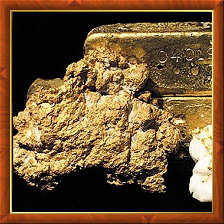|

Gold Rush
10,000 white men invaded Cherokee land in Dahlonega (Da-lon-e-ga),
Georgia in 1828 with gold fever. The momentum of this wave of whites
would wash the Cherokee off their land. No amount of persuasion would
hold back the tide of greed for riches.
When Jackson was elected president in 1828, his first act was to get the
Indian Removal bill passed. Georgia, confident in presidential support,
passed laws that Cherokees could not dig gold even on their own land.
Cherokee law was declared null and void and Georgia law was established
as the supreme law of the land. Whites had to take an oath of loyalty to
Georgia.
Cherokee land was unlawfully usurped by Georgia and sold by lottery
where no Cherokee could participate.
The Cherokee were split between the Treaty Party, those willing to take
what the government offered, and those like John Ross, who were against.
John Ross hope to have a star on the U.S. flag for the State of Cherokee
was in vain. His dream was denied by Andrew Jackson, for despite the
Supreme Court's ruling that Georgia's acts were unlawful, Jackson
refused to enforce the law.
On December 29, 1835, Major Ridge, leader of the Treaty Party, signed a
treaty in New Echota by which the Cherokee ceded all lands east of the
Mississippi river in return for western lands and other considerations.
The treaty was without authority of the Cherokee Nation, but all who
signed received payment and land. John Ross carried a petition to
Washington with 15,000 signatures, 90 percent of all Cherokee, in
protest. Davy Crockett lost his seat in Congress for opposing Jackson's
views on Indian Removal. When he returned home, his property had been
drawn by lottery and granted to a Georgian. Dispossessed, John Ross
shared the fate of his fellow tribesmen. He built a one-room cabin at
"Red Hill" or Flint Springs, TN, near the Red Clay Council Grounds,
which served as the last capital of the Cherokee Nation in the east.
It is somewhat ironic, that the Federal government also declared in 1835
that anyone with one-quarter Indian blood was considered to be an
Indian. John Ross, although having only 1/8 Indian blood, identified
himself as Indian and aligned with the Cherokee. The seizure of his land
and property were not only immoral, they were illegal. |







